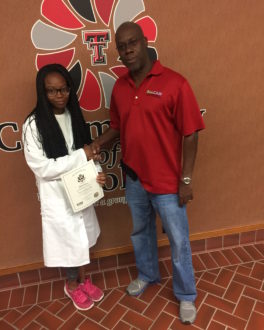November 8, 2017

Mentoring apprentices is a full circle for Stephen Bayne, Ph.D., associate chair for graduate studies and professor at Texas Tech University. Among his many positions at Texas Tech and previously at the U.S. Army Research Laboratory, one that he treasures most is that of mentor to high school students in the Research and Engineering Apprenticeship Program (REAP).
Bayne’s education and career paths, as he reports, were a non-traditional. He came to the United States at age 17 and later joined the Air Force, where he served in the Civil Engineering Squadron. He went to school to earn his bachelor’s degree in electrical engineering and worked a retail job at night. Along the way, one of his professors saw promise in him and offered Bayne a job in his lab under one condition: that Bayne continue his education to a master’s degree. This opportunity allowed Bayne to quit his retail job and focus solely on engineering, specifically power electronics, one of the fields that had funding during the ‘90s economic crash. Power electronics are used to control and transfer energy at high efficiency. Systems such as solar, wind and hybrid electric vehicles all use power electronics for power transfer and control, relying on what are called solid state switches to modulate the power flow. These solid state switches must be able to block high voltage, conduct high current and switch at high frequency. This work led him to earn a Ph.D. in electrical engineering, positions in the Navy Research Lab and eventually the role of branch chief at the U.S. Army Research Laboratory in Adelphi.
While working on some of the most cutting-edge research in powering satellites, solid state electronics and power electronics, Bayne promised himself he would go back to a university setting. Once again, Texas Tech came through and he returned as a tenure-track professor and member of the Center for Pulse Power and Power Electronics. Back in Texas, Bayne reached out to the U.S. Army and started the REAP program at TTU. Since the inception of the program, 31 high school student apprentices have participated. “Apprentices come with some interest in engineering and through the program gain hands-on experience and excitement to continue their work in engineering,” explains Bayne. “We teach them some background knowledge and then design experiments that challenge them to learn more.” The program is also strongly supported by TTU’s electrical and computer engineering department.
REAP is one of three apprenticeship programs offered by the U.S. Army Educational Outreach Program. Forty-one universities across the country host REAP through 150 mentors. This number is sure to grow with the help Bayne, who is encouraging one of his former graduate students, now an assistant professor at another university, to apply to become a REAP mentor.
AEOP is now accepting applications for all of its apprenticeship programs. Visit http://www.usaeop.com/programs to learn more and apply.

Research & Engineering Apprenticeship Program (REAP)
Research & Engineering Apprenticeship Program is a summer research apprenticeships at area colleges and universities for students historically underrepresented in STEM.
More About Research & Engineering Apprenticeship Program (REAP)Find a Volunteering Opportunity
Visit our Program Volunteers page for a tool to find the best opportunity for you.
